|
|
|
Sort Order |
|
|
|
Items / Page
|
|
|
|
|
|
|
| Srl | Item |
| 1 |
ID:
156807
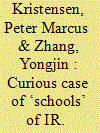

|
|
|
|
|
| Summary/Abstract |
This article interrogates the questions evoked by the curious case of ‘schools’ of thought in International Relations (IR) through the twin perspectives of the sociology of knowledge and geopolitics of knowledge. Drawing inspirations from the tradition of the sociology of IR pioneered by E. H. Carr, the paper first explores how geo-epistemic diversity can help understand the sociologically problematic nature of IR knowledge production in the existing discipline. Taking cues from Randall Collins’s sociology of philosophies, the article moves to identify four clusters of sociological conditions and dynamics that, we argue, facilitate the formation and sustain the operation of schools of thought in IR. Taking seriously the recent insight from geopolitics of knowledge, the article then looks at why and how school labelling constitutes a battleground for contestation and legitimation of knowledge. While the ‘core’ uses the school label to create a parallel, and explicitly inferior, universe of knowledge production to localize theoretical noises from the peripheries, the school label, we argue, has been proactively appropriated by those at peripheries and semi-peripheries for three strategic purposes: to engage in a purposely contentious politics, to question the claim of the American ‘core’ as the creator, depositor, and distributor of universal knowledge, and to unveil the geo-historical linkage between the political and the epistemic. School labelling matters, we further argue, because it has become a site of contestation of geopolitics of knowledge and reflects the perils and promises in our collective pursuit of constructing a truly global IR.
|
|
|
|
|
|
|
|
|
|
|
|
|
|
|
|
| 2 |
ID:
160566
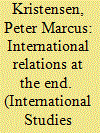

|
|
|
|
|
| Summary/Abstract |
Recent interventions suggest that the discipline of international relations has moved beyond “grand theories” and “great debates” toward middle range theorizing and quantitative hypothesis testing. At the same time, scholars argue that the field is fragmenting into insular camps. I subject these claims to an analysis that borrows from scholarship on the sociology of science. I apply network analytical methods to dissect the structure of the discipline: its dominant camps, the relationship among them, and their relative role in the discipline. I identify several citation camps, primarily delineated by theory, but also methods and subfields. The realist, liberal institutionalist, and constructivist camps continue to occupy a central role in the field. All three “isms” are identifiable as separate communities. But they are also more closely intertwined and cross-contaminated than the fragmentation thesis suggests. At the margins of the isms, connecting via constructivism, we find three theoretical camps: post-structuralism, English School, and neo-Marxist critical theory. Separate from the theoretical region, we find two camps of formal modeling, methods, and quantitative studies of inter- and intra-state conflict. The most-cited works in the field include both those engaged in grand theorization and quantitative hypothesis testing, but it is still the theoretical camps, the three isms in particular, that give international relations its distinctive sociological structure.
|
|
|
|
|
|
|
|
|
|
|
|
|
|
|
|
| 3 |
ID:
137210
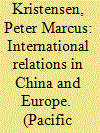

|
|
|
|
|
| Summary/Abstract |
The international relations (IR) discipline is known as an ‘American Social Science’ dominated by scholars and theories from the US core. This paper compares IR in two noncore settings, China and Europe. It shows that there is a growing institutional and intellectual integration into global Anglophone, mostly American, IR in both Europe and China. Both Chinese and European IR communities have established top Anglophone journals like the European Journal of International Relations and the Chinese Journal of International Politics to spearhead their integration into mainstream Anglophone IR and carve out a space for regional thinking. Yet, the analysis of their publication and citation patterns shows that IR outside the American core communicates through a hub-and-spokes system where there is always a connection to the American core but rarely very strong linkages to other peripheral regions. The two journals studied thus function as outlets for ‘local’ and American scholars, rely on ‘local’ and American sources, and there is very little integration and exchange between Chinese and European IR. Chinese and European IR would benefit from such a dialogue, especially regarding ‘schools’ of IR at the margins of an ‘American social science’.
|
|
|
|
|
|
|
|
|
|
|
|
|
|
|
|
| 4 |
ID:
140874
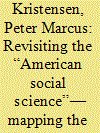

|
|
|
|
|
| Summary/Abstract |
This paper studies the geography of the International Relations (IR) discipline, particularly the notion that IR is an “American social science.” First, it analyzes bibliometric data and finds that US-based scholars continue to dominate IR journals, but also that IR is one of the least US-dominated social sciences and that it has become markedly less so since the 1960s. Second, the paper argues that conventional measures based on nation-state affiliation capture only part of the spatial structures of inequality. It employs novel visualization tools to present an alternative map of elite stratification in IR. Instead of looking at national cores and peripheries, it maps the social network structures of authorship and coauthorship in key IR journals. By mapping city and institutional output, it finds stratification structures within the American discipline. Elite institutions in Northeast America, rather than “America,” dominate the field's leading journals. A similar stratification is found in Western Europe. Moreover, network linkages in terms of both coauthorships and doctoral backgrounds tie these Northeast American and West European elites together. The paper concludes that while US dominance in IR journals is in decline, this has not yet made the discipline as international as its name warrants.
|
|
|
|
|
|
|
|
|
|
|
|
|
|
|
|
| 5 |
ID:
192316
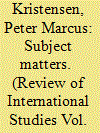

|
|
|
|
|
| Summary/Abstract |
This article contributes to the critical historical research that has demythologised the ‘noble origins’ of the International Relations discipline (IR) by exposing its imperial, colonial, and racist legacies. Where most critical historiographies have unveiled the centrality of racialised and imperialist ontologies in individual thinkers and theories, this article traces imperialist origins of international thought by reconstructing its impact on administrative-institutional infrastructures. Specifically, it interrogates the most systematic and institutionalised attempt to define the ‘subject matter’ of IR under the International Studies Conference (ISC) organised by the International Institute of Intellectual Cooperation (IIIC) of the League of Nations. Through a parallel reading of the archives from ISC's ‘administrative meetings’ and ‘study meetings’, the article contends that the seemingly academic discussions on the subject matter of IR in the ‘administrative meetings’ were in fact intertwined with the imperialist-colonial politics central to ‘study meetings’. The article thus not only challenges IR's conventional history, but its historical ontologies by revealing how race and empire were central to the constitution of its very subject matter and its early institutionalisation.
|
|
|
|
|
|
|
|
|
|
|
|
|
|
|
|
|
|
|
|
|